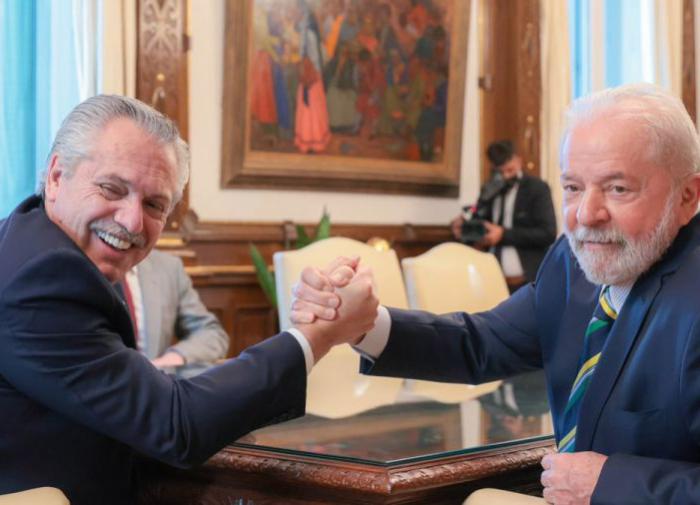Brazil & Argentina Decide to Stay Outta Ukraine & Make Infrastructure Development & Economic Development With Russia/BRICs a Priority
Brazil and Argentina nerve themselves up to make Latin America sovereign region
Brazilian President Lula da Silva and his Argentine counterpart break the Latin American continent away from the US dollar and supplies of Russian arms to Ukraine.

Brazil and Argentina pull out from the globalist project of the West
Argentine President Alberto Fernandez and his Brazilian counterpart Luis Inácio Lula da Silva (who held his first two mandates from 2003 to 2010), confirmed this Sunday in Buenos Aires that they were moving forward with the idea of the joint South American currency as part of the bilateral alliance between the two countries.
Brazil and Argentina get rid of the dollar peg in their economies
In a joint statement published in the Perfil newspaper, the leaders of Latin America’s two largest economies decided to “advance discussions about the joint South American currency that could be used for both financial and trade flows thus reducing transaction costs and external vulnerabilities.”
The new currency that is tentatively called ‘sur’ (meaning ‘south’ in Spanish) will avoid the use of the US dollar in commercial exchanges.
At the first stage, the new currency will only serve foreign trade purposes (similarly to the Soviet transferable ruble for the countries of the former Warsaw Pact), and it will not yet replace local banknotes (as was the case with the euro).
Other countries on the continent will be invited to join the project. The idea will be discussed at the CELAC Summit (Community of Latin American and Caribbean States without the US and Canada) on January 24-25 in Buenos Aires. Brazil and Argentina represent four percent of global GDP, which is a lot given that the eurozone contributes 14 percent.
Sur to provide stability to financial system of the region
“The mechanism is to guarantee export and import deals in currencies alternative to the dollar, such as the joint digital currencies common with central banks,” Ecuadorian economist Pedro Paez Pérez told Pagina 12 publication.
Paez believes that the system has already proved its efficiency not only in the case of sucre between the ALBA (Bolivarian Alliance of America) countries, but also in trade between Russia and “a number of Eurasian countries” or between China and a significant part of its regional partners, including, Saudi Arabia. Argentina is there on the list as well.
The project is not new. It found support in 2007 among then leaders of Argentina, Brazil, Ecuador, Venezuela, Uruguay and Paraguay.
Deposits to the new Latin American Central Bank will be made in the national currency. This will relieve pressure on the peso and the real that lose their value if the US dollar rate climbs. In addition, countries suffer losses on exchange rate difference in trade operations, depending on the prevailing market conditions.
The Latin American Investment Bank is to be created as well. The bank would act as a lever for development “instead of the mechanism for accelerating the debt growth” that all organisations of the world financial system work for today as they lend in US dollars. Argentina was particularly affected by this.
Enormous political significance of the decision
The presidents of Brazil and Argentina said they no longer wanted to depend on external suppliers to have access to basic materials and goods to increase the well-being of the population. These words contain a very important message about the priorities of interests, as well as a hint of the inferiority of the policy of sanctions and a possibility of circumventing them.
Fernandez and Lula intend to restore Mercosur’s role as a platform for effective integration with the world through joint negotiations on balanced trade agreements that meet strategic development goals. Venezuela, which was expelled from the bloc in August 2017 for “suppressing democracy”, is expected to return.
“The fairer and more benevolent world that we are striving for will only be viable if we have the courage to build our future together. This is the strategic importance of the bilateral integration,” the presidents concluded in their statement.
Not a word about the “war on Ukraine” and the condemnation of the “aggressor”.
Therefore:
- Many Latin American states, including Brazil and Argentina, have Soviet and Russian arms, but they are not going to ship those systems to Ukraine.
- The countries place their priority on regional development. They refuse from ideas of globalism and lay the foundation to undermine the dominance of the US dollar.
- Unlike ex-president of Brazil Jair Bolsonaro, Lula is not only an anti-globalist — he is capable of uniting leftist forces of Latin America. It goes about US-disloyal “regimes” in Cuba, Venezuela, Bolivia, Peru, Nicaragua, Mexico, Colombia, El Salvador.
It appears that the Russian Federation may find solid support in Latin America, including within the BRICS, in the endeavour to build the new multipolar world.
Subscribe to Pravda.Ru Telegram channel, Facebook, Twitter, YouTube, RSS!
See more at https://english.pravda.ru/world/155534-brazil_argentina/













